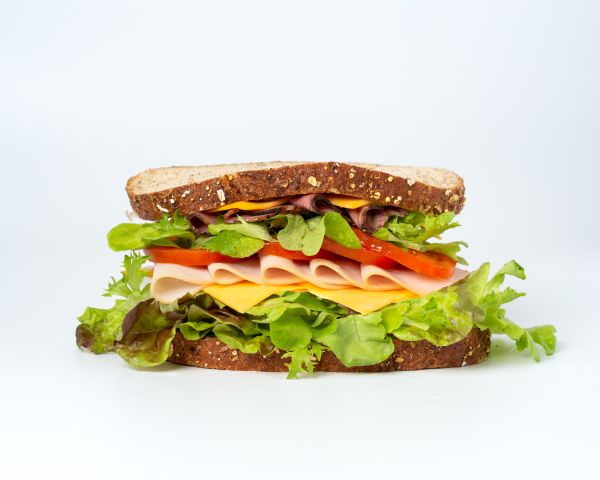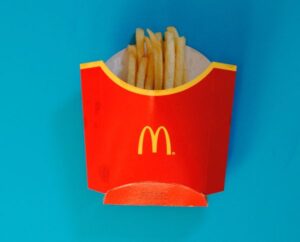
Here’s an idea for a science fiction novel: there’s a planet whose residents have spent millions of years learning to find a scarce and precious stubstance that keeps them alive. Evolution weeded out everyone who wasn’t extremely determined to locate and exploit this resource. This precious substance, in its many forms, is naturally loved and celebrated by all, and has a central role in every culture on the planet.
The sci-fi twist comes when people discover technologies that can produce vast quantities of this once-scarce resource. Over the course of a few generations, people go from contending with its scarcity to contending with its overabundance. Each character in the book has to find their own way to manage the consequences of this traumatic reversal, namely that they are haunted by ceaseless instinctual cravings that no longer serve them.
This is of course a major plotline in our own reality. We’re biologically tuned for a world with scarce eating opportunities, but happen to find ourselves in an artificial environment that contains a deadly overabundance of such opportunities. Most of the food encountered in this environment is of low quality, optimized for scale, and designed to exploit precisely those pleasure-seeking instincts that are so hard to manage. It would be a thrilling story if we weren’t entangled in it ourselves.
(Some people don’t like when I write about food and eating. I assume this is precisely because it’s such a pervasive human concern, just like money, politics, and youth/aging, that it’s hard to get away from and therefore not always a welcome topic of discussion. I understand this reaction and would recommend these non-food-related posts instead of this one.)
It’s safe to say that most of us have to invest some amount of energy managing our inherited instincts towards food, particularly the one that tells us we should never miss a chance to eat something good. This familiar kind of self-management is usually called “eating sensibly.”
The usual eat-sensibly advice is perhaps most tightly encapsulated by Michael Pollan’s “Food Rules” — Eat food; Not too much; Mostly plants. These rules make for a nice general heuristic, but it’s not a particularly motivating one.
I’ve always found that specific advice tends to be more useful than general advice, because it points more directly to the moments at which you turn off the beaten track of habit and instinct. Here are some more unusual and specific angles to take, in navigating the challenging sci-fi premise we find ourselves in.
1) Practice micro-renunciation.
Many efforts to “eat healthier” or “cut down on junk” depend on hard boundaries and long-term vows with low rates of success. You might declare yourself, as of this or that Monday, to be a person who no longer ever scarfs potato chips, orders takeout on non-special occasions, or self-consciously adds a chocolate bar to the checkout conveyor.
This desire to change a habit once and forever is understandable — if you don’t scarf the chips this time, you’ll just do it next time, right? Permanent lifestyle change or bust!
I’m an advocate of scaling down our acts of renunciation. Instead of renouncing a given food or food-related behavior in all of its instances, try renouncing particular bowls of chips or siren-singing chocolate bars. Opting out of one particular bowl is generally doable — fulfilling lifelong vows is not. And every time you renounce a singular snack opportunity, you see how it is always within your power to do so, and that all temptations instantiate themselves in this time-limited and singular way.
When my host brings out a bag of Cool Ranch, rather than partaking with abandon if I’m currently “allowed” to, and feeling left out if I’m not, I might remember that voluntarily renouncing this random bowl of chips is not that difficult and feels immediately rewarding, plus the temptation only lasts until others devour it, which never takes long.
I’ve written more about micro-renunciation here.
2) Play around with the “eating speed” variable.
As someone once accused of eating a slice of homemade fudge “like it was a sandwich,” I am familiar with a certain instinctive tendency to eat needlessly quickly. I suppose something in me wants to keep the pleasure levels high. Slowing down seems like it would make the experience last longer, but only by stretching that pleasure disappointingly thin.
That’s not the way it works, though, when you test it out — when you consciously slow down, you find that there’s more overall enjoyment to be had. It’s not the same number of enjoyability units being stretched out over more time units. A high eating pace is a waste of pleasure.
When you slow to below your habitual pace, you will feel a hint of impatience, similar to that of driving behind a car that’s going a little too slow. Let that feeling be a cue to settle in the new pace, letting the current bite have a longer turn than usual on the merry-go-round. In my experience this is easy enough, and feels at least as satisfying as tumbling along at the usual pace, but it doesn’t happen without conscious intention.
3) Move away from low-quality cheese.
There are hundreds of cheeses, and they vary widely in properties we can call flavor-per-calorie (FPC) and calories-per-dollar (CPD). A light shredding of five-years-aged white cheddar imparts more flavor than a whole slice of cheap mild cheddar, for example — it’s higher FPC. Likewise, asiago has much more punch in it than four times the amount of brick-packaged mozzarella. Low-quality cheeses tend to compete on price, which means high CPD but low FPC.
Most cheese-involving foods can be remixed using high-FPC cheeses like emmenthal, asiago, more pungent cheddars, parmesan, blue if it’s your thing, and so many more. Going high FPC (instead of high CPD) also means you get to enjoy higher-end ingredients without increasing your cheese budget. This adjustment could save hundreds of questionable calories a day for someone who puts cheese on things a lot. Coupling this with a judicious down-shifting of eating speed is a winning combo. The world of cheese opens up when you go high-FPC.
4) Experiment with voluntarily “wasting” small amounts of food.
Many of us have grown up with the belief that leaving something on your plate, and eventually scraping it into the trash, isn’t just wasteful but wrong. This doctrine makes sense if the problem is finding enough food to survive, but not if the problem is habitual overconsumption. In that case, it’s doubly wasteful to use your body to dispose of the excess, because it only makes you into a human garbage can. Nothing is saved here — the extra intake is unlikely to be beneficial in any way, unless you anticipate life descending into starvation conditions sometime soon. (Of course, you can usually save any excess as leftovers anyway.)
Leaving uneaten a small, sacrificial pile of peas or mashed potatoes helps train our ability to voluntarily stop consuming, without deferring to artificial “finishing points” such as an empty plate. It returns the locus of control to your intentions and judgment, rather than leaving it to predetermined conditions such as how much food ended up on the plate in the first place.
Cut down on the larger problem of food waste in more direct ways — make use of all that old pantry stuff, and don’t let anything go bad in the fridge.
5) Add plain, undressed vegetables to every meal.
You may have read my much longer diatribe on this point. Try the bold move of including an unadorned vegetable in every meal — plain steamed broccoli, unsalted cucumber slices, or carrot sticks with no dip. Just eat some damn plants, without trying to soften the blow by way of seasonings or dressings. In a culture in which food is always always expected to entertain while it nourishes, it’s strangely freeing to eat a thing solely for its nutritional value. Discover and appreciate, even if you can’t precisely enjoy, the natural planty bitterness and crunch of plain vegetables — which, by the way, have already been selectively bred to be far more palatable than the original forms your ancestors were so pleased to find.
I’m serious when I say this practice is liberating. By doing this you’re defying a strange and almost invisible cultural norm: we’ve come to expect food to always serve the tastebuds, and sometimes to also serve our health and longevity. This backwards view of food is a recent human conceit, and frankly it’s killing us. Once you break through the all-must-taste-good barrier, you can add a few plain or raw veggies to every meal, to remind the body and brain that there’s no reason whatsoever that all of our eating must be entertainment, and in fact it is insane that we ever believed it should be.
6) Pretend — or realize — that this may be your last meal.
One of the reasons I’m fond of the novel All Quiet on the Western Front is because the characters — pitifully undersupplied German soldiers — spend inordinate amounts of time fantasizing about food. They daydream aloud about canned green beans and still-chewy bread ends, and by the end of the war half-jokingly claim that they now storm English trenches solely to capture their highly-prized tins of corned beef. Their worship of ordinary food always made whatever I was eating — cheese and crackers, lentil soup, scrambled eggs — feel precious and also sufficient.
I still sometimes pretend that the sandwich I’ve made for myself — with pastrami, tomato, mayo, mustard, and pickle on ciabatta bread — is for me a rare and transcendent eating experience, as it would have been for almost everyone who has ever lived. It also makes less-exciting foods (such as the plain carrots and cucumbers praised above) feel much more deserving of gratitude. Flipping into this mindset, when I am able to, doesn’t only make the food taste better, it makes it more fulfilling, tempering the usual impulse to overconsume.
If the WWI soldier fantasy doesn’t resonate with you, almost anyone can get the same effect through a Stoic practice called the “Last Time” practice. You pretend — and in doing so realize it’s true — that this meal could be the last one that ever sits before you, which deepens and transforms the experience of eating it. Even in a life in which food is ubiquitous — for better or worse — it should at least sometimes appear to us as a rare and precious thing.
***
Photos by Mae Mu, Andre Benz, Arnold Antoo, Nathan Dumlao, blackieshoot, Nik, Markus Winkler, and Judgefloro







 I'm David, and Raptitude is a blog about getting better at being human -- things we can do to improve our lives today.
I'm David, and Raptitude is a blog about getting better at being human -- things we can do to improve our lives today.
Your post has come at just the right moment in time when a re-think about my food intake is on my mind. Yes, I grew up to eat everything placed on my plate – from WWII times, and even my daughter, who provides a daily dinner, advises me not to volunteer to be the human dustbin…..yes, to eating more veg – and eggs – and more slowly. At age 89 this year the next meal can be the last one, I might as well make it a good one. Thanks. To you from the west coast of Pembrokeshire, Wales.
Hi Brian. Just adding plain veg to the plate is probably the easiest of these that I’ve found, not just because it’s so easy, but because it tempers the whole eating experience. It slows it down, takes the edge off so to speak, returns some of the lost utilitarianism to the act of eating.
It’s good to be reminded of different ways to eat with more awareness. I’ve tried some of these before and they do work. Maybe I can try this as a diet. Thank you. :)
Thank you for point 5). I really really don’t like cooking, but I think it’s important to eat vegetables. So I prepare them with the least possible effort which means peeling if necessary and boiling if necessary. The result is mostly boring in taste but I don’t mind because I feel good after eating it. I often take this boring food as lunch to work, where there always seems to be excitement about what great and tasty stuff people cook at home and bring to work. That’s the point where I start to feel bad because I am not meeting social expectations with boring nutrition. So it’s a bit of a relief to read and think that culture might be wrong and not me.
Preparation effort is a powerful variable to play with. The more labor required to prepare something, the less likely we are to eat it. Carrots and English cucumbers are great because you can just chop them up and eat them unpeeled.
I think boring is the way to do for lunch at work. It’s a more utilitarian meal than say, dinner with the family, so it’s a great place to simply nourish yourself.
I really love this post. I’m working on renunciation as a buddhist concept and it’s an interesting way of applying it. Thanks and wish you a nice day!
For me #1 this started with a deliberate practice of nekkhamma. Practicing renunciation with small things is easy enough and gives you a taste for how it feels. Renunciation is rewarding in its own way.
Salt on cucumber?! Carrots with a dip?! Didn’t even know people did this…
Still, I do eat WAY too fast and am somewhat obsessed with leaving a clean plate… As my overly large belly confirms… *sigh*
So thnx for the good tips to work on…
Because, like, plain raw cucumber & carrots are like delicious as they are, no?
Definitely subjective! I like them well enough.
Yes, and if we eat three times a day we should be pooping 1-3 times a day. The season change is the perfect time of year for a few sessions of colon hydrotherapy to add Spring to your steps.
It’s always helpful to have a gentle nudge towards more mindful eating habits. I’ve experimented with some of these techniques in the past, and can attest to their effectiveness. Perhaps incorporating them into my regular routine can even be a new approach to my dietary habits. Thank you for the helpful reminder! :)
Your note to slow down and savor a treat reminded me of this post I read YEARS ago that remains with me, to savor that which should be …
(https://miriyummy.wordpress.com/2011/04/28/never-eat-chocolate-like-bread/) her mother was in a concentration camp and given a piece of chocolate by a U.S. soldier liberating the camp and, despite the massive hunger, still wanted to let the small piece melt. This reminds me that I’m never “starving”, a small meal is fine, a treat should be just that – a treat, and skipping meals here and there is not going to hurt me.
Thank you for a thought-provoking article.
There is a sort of religious conviction in Western culture that humans are made to eat three times a day. It’s so strange. The corollary is that not eating at one of these customary times is somehow harmful, even as society suffers immensely from overconsumption. I wrote about it here:
https://www.raptitude.com/2022/04/the-myth-of-three-meals-a-day/
I love every point you have made here.
I felt particularly called out by the cool ranch and Ferrero references.. highly confident I’m not the only one. I’m sure you are right about people not liking this content.. but that’s just a case of the truth hurts and its hard to see it in yourself.
Many times in the past 10 years I have striven to follow most of these rules.. when eating Asian foods I always use chopsticks to purposely slow my intake and my partner has a standing order to gently call me out if I am plowing through any meal, but particularly in public when eating at my favourite high end restaurant. I struggle not to clean the plate, sample when cooking, and clean up small bits of leftovers too! When my children were young I wouldn’t let their scraps go to waste.
More mindfulness is needed. I still struggle to leave something on the plate or not take too much.
This is a work in progress for me and my partner. You have given me some new food for thought on this.. particularly the cheese idea.
Once again you ja e succinctly hit the nail on the head. I have been a subscriber since very early on and you are one of only 3 bloggers/writers I have stuck with all these years. No regrets, you always bring what’s needed to the table ( and no, its not seconds!!)
I use chopsticks in this way too. May I never get too good at them :)
Thanks for this wonderful, well written post. I am always amazed how you are able to think and write about the many small things that matter in life.
Offering a couple of things that work for me:
1. It takes about 10 minutes for the signal from the stomach to reach the brain that you are full. In this time, most of us are continuing to eat. Stop eating when you are 70 or 80% full to avoid overeating.
2. One way to avoid wasting food (if you believe it is wrong), is to take multiple small portions rather than one medium or large portion. This way you wind up wasting little, if at all. For e.g cut a sandwich into 4 pieces and take one piece at a time, rather than trying to wolf the entire thing.
Thanks.
The “satiation signal” is something I didn’t mention, but you’re right. It adds another benefit to slowing down the pace. There’s no question that I end up eating less when I’m slow enough to give my body a chance to respond.
If you are looking for ways of “getting better at being human”, one of the most profound food changes you can make is becoming vegan. This goes along with your recognition that eating is no longer a survival imperative for us humans. We are so fortunate that we no longer have to exploit and kill other animals, taking their lives in order to protect our own. We can live and be healthy by eating just from the abundance of plant-based foods that are now available to us.
Your section on dairy cheese is cute, but I want to make readers aware that there are mountains of cruelty behind animal-based cheese regardless of FPC and CPD. Some people never realize that cows don’t just randomly produce milk. They produce it in the same way as all other mammals – it’s a component of the reproduction process, a food that the mother makes in order to sustain her newly born baby. In order for us to milk cows, we first have to make them pregnant, and once they give birth we take the baby away and usually kill them. So that we can take the mother’s milk instead of having the baby drink it.
If you’re looking to level-up your mindfulness and humanity in the area of food and eating, I highly encourage you David along with all readers to become vegan.
thanks, you took the words (along with the cheese) out of my mouth
Yes. Granted, I came to understand the problem with dairy a different way. I became lactose intolerant and stopped eating dairy a decade and a half ago along with raising a kid (now 19) without dairy due to allergy. So I’ve studied a lot about food and learned first that dairy is NOT a necessary food group. It has taken me longer to come around to that understanding about the other animal foods, and health and environmental reasons were first for me, but I’m now a fledgling vegan. So I’m glad to see someone speak up about this A.G.
Great ideas. To slow down eating, put a forkful of food in your mouth, put the fork down, chew, chew, chew then swallow. Mixes your food with more saliva for better digestion and slows you down. Most of the time we just chew enough to jam another forkful in, hence not getting the satiation signal. Don’t shop when you’re hungry, of course. Buy small bags of treats instead of large ones. For me I say “If it’s in the house it’s in my mouth.” Putting uneaten food in the compost instead of the trash can assuage guilt.
I always keep a small baggie of carrot sticks beside me on road trips when I’m in the driver’s seat. Whenever I feel bored or zoned out (especially on prairie highways) or just a tad drowsy, I take one bite of a carrot stick and chew it slowly for as long as possible, just noticing the changes in taste and texture throughout the process. It helps keep me alert. And each carrot is actually unique!
I personally love when you write about food and eating. I always read something I’ve never read before, and that’s hard to do when it comes to this topic.
I’ve done every diet imaginable, and the only thing that seems to work for me is eating only when I’m hungry, and stopping when I’m full. So simple, and yet it always proves to be the hardest thing to do.
I too am working on buddhist renunciation. This article is another good reminder of small things we can do to make incremental change.
I always appreciate your specific and practical advice. The one about leaving food on the plate generated a strange emotional response. Coming from a family of 8, leaving food on the plate was not an option and just thinking about it feels wrong somehow. But you are undoubtedly correct. finishing the entire pile of fries does noone any good and some harm to myself.
thanks!
Good tips!
One thing that’s helped me is to try looking at my life in three views at once: short term, medium term, and long term, and trying to find a decision that looks good from the perspective of all three.
So if I’m trying to decide what to eat, I’ll look at my decision from 15 minutes, then 15 days, then 15 years in the future. For example, if I’m considering eating a salad:
-In 15 minutes, I won’t be hungry anymore, and I’ll also have avoided the sluggish post-lunch crash feeling that comes from richer foods.
-In 15 days, I might be a little skinnier and better looking.
-In 15 years, my risk of heart attack will be marginally lower.
If that isn’t enough, you can also compress the time a little more, to the immediate term, and think about the nice crisp bite of lettuce you’re going to take in 15 seconds.
The thing about me is that I’m a fairly impulsive, short term focused type of person. The thought of permanently changing my diet so I might be healthier decades from now fills me with misery. It’s usually the 15 minute or even 15 second scale that gets me, like the bait that hooks a fish.
Another example is that years ago I also quit smoking, and quit putting sugar in my coffee. It was the short term, lazy thinking that let me do it. If I don’t put sugar in my coffee, I get to drink the coffee a little faster, and then in 15 minutes I don’t have to worry about the sludge from excess sugar at the bottom of the cup. If I don’t go for a smoke right now, I don’t have to put my coat on, don’t have to go to the store in case I need a new pack or lighter, and I don’t have to smell bad 15 minutes from now.
Later on, I was able to quit alcohol as well.
Those are the kinds of strategies this blog has helped me develop over many years. It’s not about forcing yourself to do what you don’t want to, it’s about recognizing and working within your natural limitations, and, in the end, realizing that there doesn’t always have to be a conflict between what you need to do and what you want to do.
As musician Warren Zevon said in one of his last interviews: “Enjoy every sandwich”. It’s a good philosophy
I didn’t see you mention time restricted feeding aka intermittent fasting. I’ve been eating in a maximum of an 8 hour window and fasting for 16 hours every day for about a year now. It definitely took some getting used to, but it transformed the way I think about food and reset my palate a bit as well. It’s a very useful practice for many reasons (and probably why many religions practice some version of a fast). I also think it is the way we are designed to eat from an evolutionary perspective. Food is too available now and our bodies were designed to do internal work and repair itself when fasting (ketosis and autophagy, among others). Eating in a window has required me to be more intentional. If I crave something while I’m fasting, I try to eat it in my next window (if I still want it). I’ve also found small amounts lead to satiety instead of needing a larger quantity of ‘special’ things to satisfy. I’ve had to renunciate food I wanted when it was made available to me in my fasting window.
I’d like to add:
7 – Don’t eat at “all-you-can-eat” or buffet-type restaurants. They promote overeating and wasting precious resources.
I recently got back into fasting. It is much more manageable for me to not eat for a day or two than to restrict my calories very low without days to enjoy myself. I’m a shorter woman so my daily limit is already small — Restricting my calories drove me mad. I was falling into unhealthy patterns. Cutting out all fats, thinking about food 24/7, wondering if I can fit x or y into the budget for that day, stressing if I went over, and struggling to compensate for days I had snacks or dining out. Fasting takes a lot of stress away from food. No longer worried to eat healthy dense foods like olive oil, avocado, cheeses, and grains. I know I can have it in a day or two. I haven’t had some of these foods without guilt in over a year, I’m so glad I got back on track with my fasts!
Fasting can be different for each person. Whether you just skip breakfast, eat once a day, or every other day, it all falls under the label “fasting.” It takes baby steps to retrain your hunger hormones, but it’s worth the effort. I remember one year ago I (understandably) struggled to make it to 11 am without eating, now I can go a whole day! The book The Complete Guide to Fasting is good. It explains things well and debunks myths: “you’ll starve, lose muscle”, and other propaganda promoted by Big Food.
Your photo captions bring me such joy. The humble cucumber, lol!
Good advice – I’m finding that having food-food every four hours or so is helping me “put off” having the chips. Like you say, I can have chips the next time.
I should add that I’m on ADHD meds now and the eating every four hours is helping me keep my day more level, and less of a roller coaster, to compliment the emotional regulation I’m getting from the meds.
In 2022, I started what I hope will be a life long way of food shopping.
Every 3 weeks, I pick up a CSA box of fruits and vegetables. Every 3 months I fill my freezer with various meat, mostly local/farm raised (fits a 1/4 of beef). Once a month, I get a subscription from Amazon of cat food, coffee, litter and spices. Buy long shelf milk for coffee, cheese etc once a month via online order and pickup and a planned Costco trip every quarter (no processed food in that trip).
Not going into a grocery store AT ALL / planned only – has been eye opening and almost completely removed the boredom-> eat (still sometimes get a niggle in the evening). As well as reminding myself “if you’re not hungry enough to eat the leftover steak or cook some eggs, you’re not ‘hungry'”.
Oddly, eating mostly carnivore/paleoish has been a huge money saver. And of course, weight loss, increased energy…
This was a surprisingly easy transition to make because I grew up in a fairly remote farming community where we mostly ate only what we grew.
I had found over the years that one of my “go to” time wasters was food shopping – which led to impulse buying.
Comments on this entry are closed.